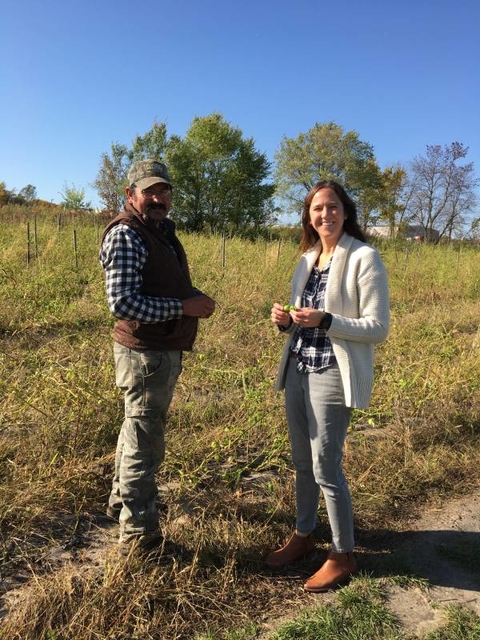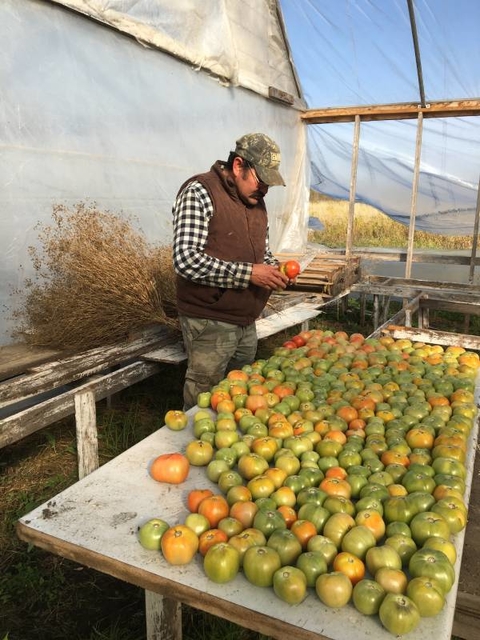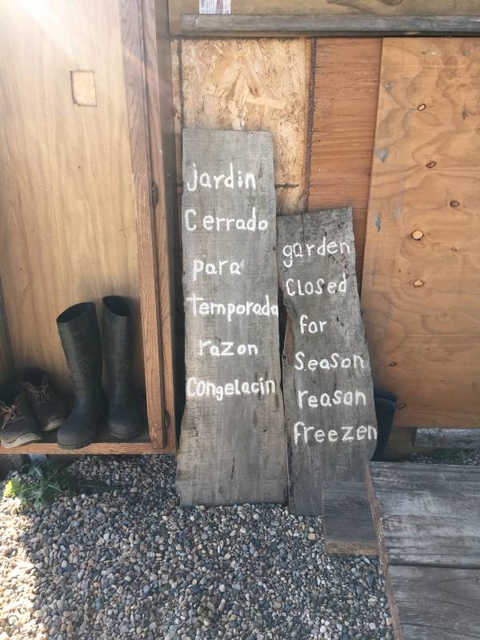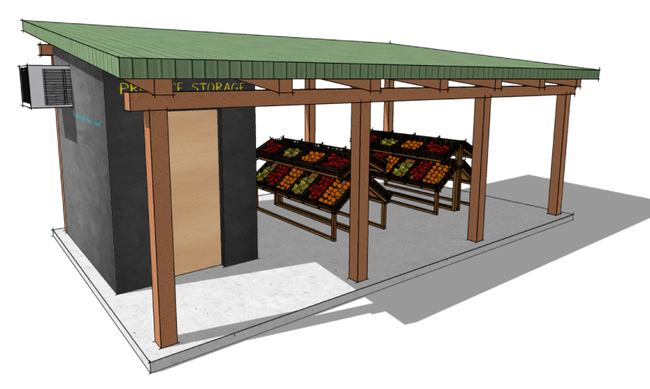Although named after a small community in north-central Mexico, Cooperativa Agua Gorda has spent nearly a decade growing deep roots in Minnesota.

Javier Garcia (left) and Molly Zins (right) at the end of the growing season, 2019. Photo credit: Elizabeth Quillo.
Member and owner Javier Garcia manages the certified organic farm in Long Prairie, where he and his team produce fresh melons, tomatillos, tomatoes and peppers each growing season. After finding success distributing Agua Gorda produce to Twin Cities households through the Shared Ground Farmers’ Co-op and restaurants like La Loma Tamales, Garcia has wanted to find markets closer to home.
“We want to transform Agua Gorda into a bigger business, so that we can sell locally, to local businesses, restaurants, hospitals and more,” Garcia said.
Supported by the University of Minnesota Extension Central Regional Sustainable Development Partnership (Central RSDP), Garcia started a project to research local market opportunities and barriers. Finding new markets for its fruits and vegetables could help Agua Gorda reduce its transportation costs, reach local consumers and diversify its income.
A recent report “Taking Advantage of this Moment and Opportunity: Regional market analysis and marketing recommendations for Agua Gorda Cooperative,” summarized the project’s findings. Both Spanish- and English-language versions are available.
Molly Zins, executive director of Central RSDP, noted that RSDP is committed to diversity, equity and inclusivity throughout its work, and this is one of the first examples of supporting a multilingual project team and project report.

Javier Garcia in one of Cooperativa Agua Gorda’s greenhouses, 2019. Photo credit: Elizabeth Quillo.
“We prioritized developing this project and report in Spanish, so that Agua Gorda could fully lead and engage,” Zins said. “There is no point in investing in a project and creating a report if the primary community partner and leaders aren’t able to use them.”
Laying the groundwork
Before Cooperativa Agua Gorda submitted an Idea Brief and project proposal to Central RSDP, trusted relationships helped connect Garcia and the farm to University resources.
One of those vital relationships was with Elizabeth Quillo, an educator with University of Minnesota Extension SNAP-Ed who lives in Long Prairie.
“Elizabeth has been a wonderful partner of ours for a long time,” Zins said. “In this case, her long-standing relationship with Javier Garcia, his family and Agua Gorda, as well as her talents as a licensed interpreter, helped start the conversation, which then opened the door for this partnership and multilingual project to unfold.”
Quillo was familiar with Central RSDP thanks to her volunteer role as a sustainable agriculture and food systems work group member.
“In part because of my work with Extension, as well as connections with the Latino community and more rural areas in our region, I started engaging with Central RSDP,” Quillo said. “As I learned more, I started to think, ‘This approach fits so well with Agua Gorda!’ I’d known Javier and his family for over 20 years.”

Cooperativa Agua Gorda signs in Spanish and English. Photo credit: Elizabeth Quillo.
With key relationships in place, the team hired graduate student Emily Reno (Humphrey School of Public Affairs, Masters of Urban and Regional Planning, ’20) to assist with research. According to Quillo, Reno’s passion for local food systems and Spanish language skills were a great fit.
“Emily’s whole way of honoring and respecting what Javier wanted was excellent. Having a student on the team who has their heart in this work and who has a vision for how to connect across cultures really made a difference,” Quillo said.
Reno led the project’s market analysis and reporting. She interviewed numerous potential wholesale buyers of Agua Gorda produce, including restaurant owners and other local businesses near Long Prairie.
In a recent podcast interview with The Land Stewardship Project, Reno reflected on her project experience. She noted how Latino, immigrant and small farmers often face barriers to funding, research and education, and how that needs to change.
“Proper engagement with and involvement of diverse growers requires a different way of thinking — really trying to find ways to empower those who already have close community connections to be the messenger and to find allies within the community,” Reno said.
Just the beginning
In addition to strengthened relationships and a new report, Agua Gorda’s project has been fruitful in other ways.
“This research and the whole process was a new one for me. I learned from it. I really enjoyed working with the University, since I like to experiment and see new approaches,” Garcia said.
Reno also shared how community-engaged projects are beneficial to students like herself.
“When [students] see how the work they are doing helps people they know in the community — versus just as abstract ideas — that’s so much more tangible and fulfilling,” Reno said.
More seeds have continued to sprout from connections made during this project.

Cooperativa Agua Gorda produce stand design by undergraduate student Juan Rujana.
Reno helped connect Garcia with Juan Rujana, a recent University of Minnesota graduate from the College of Design. As part of a summer internship, Rujana created designs for a Cooperativa Agua Gorda produce stand. Having a physical location in town could help the farm sell more of its produce locally and make it more visible and accessible to Long Prairie community members.
As a result, Garcia is now working with the City of Long Prairie to apply for a permit for the produce stand’s construction. He has also spoken to a farm-to-table restaurant in Alexandria interested in buying Agua Gorda produce.
Projects and connections like these will help Cooperativa Agua Gorda as it continues to grow.
“It feels like just the beginning, connecting with all these people — around not just the produce but also the relationships and the understanding between cultures. Projects like this help open people’s eyes to what the Latino community and immigrants in Minnesota do for us. We are so much richer because of that,” Quillo said.
“We hope to keep moving forward,” Garcia added.

